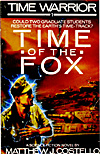 Roc, 1990, $4.50, ISBN 0-451-45041-8, 331 pages
Roc, 1990, $4.50, ISBN 0-451-45041-8, 331 pages
Time travel novels always must confront that ugly paradox of how time operates, and Costello takes the notion that altering past events will alter future events. Thus, with a time machine, you can go back to change something in the hopes that the one change will affect your own timeline. The conundrum is one of perspective. If, like dominoes (or the proverbial flapping of Chinese butterfly wings), one event after another continues to influence the next event down the line, and branching events occur to affect other branching events, you can quickly see how predicting which event will change things is not only difficult, but well nigh impossible. Then again, one theory has it that time is like a river of events, so no matter what you change, the impact is so minimal, nothing really changes.
With the former theory in mind, grad student Jim Tiber leaps back to 1962 so he can study the Beatles for his thesis. That, of course, sets offs few changes, but nothing like the other time travellers from a competing project. Hence, Tiber finds himself in a Time War. Back he goes, and quite against his will.
Now, Costello's idea of time travel is like an episode of Quantum Leap. Tiber doesn't actually dematerialize. Rather, he slips into the skin of a person--where that person's "soul" goes isn't explained. That probably would put a pox on paradoxes...
In any case, it's WWII North Africa in November 1941. Tiber becomes Fritz Wagner, communications officer to Field Marshal Erwin "Desert Fox" Rommel. Tiber must now figure out what to do, and like Quantum Leap, the borrowed body's skills and knowledge slowly come to him.
Next thing you know, Jimbo's girlfriend hops the time line express to help, and wouldn't you know it! It's a one-way ticket. So, we get to meet Goebbels, Goering, Rommel, and bunch of other Germans while trying to save Jim from death and the Allies from a Nazi victory.
The history needs some work. I wonder how a pair of German Stuka (divebombers) manage to intercept and shoot down a British Mosquito (fighter), or why Rommel believes 50mm artillery is his big strike force, or why British prisoners of war are kept with their fully fueled and armed tanks in the same camp. The rest of the desert action is as generic and sterile as the Cliff Notes for WWII Costello read.
This is the first in the Time Warrior series--but it will be my last. If you want good time travel action and theory, read Thrice Upon a Time from James Hogan.
This article appears in MagWeb (Magazine Web) on the Internet World Wide Web.
Back to List of Book Reviews: Military Science Fiction
Back to Master Book Review List
Back to MagWeb Master Magazine List
© Copyright 2000 by Coalition Web, Inc.
Other military history articles and gaming articles are available at http://www.magweb.com